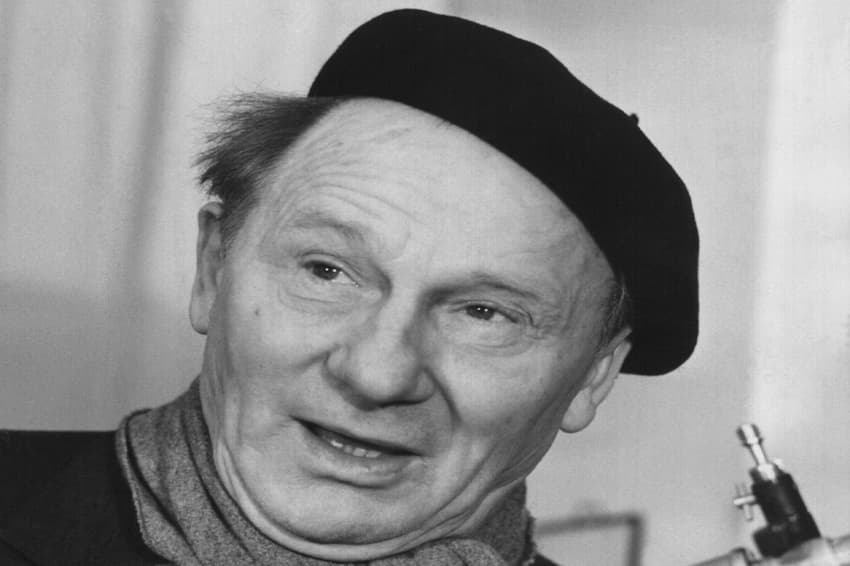How German artist Ernst Busch fought fascism through songwriting

Nearly 40 years since his death, the revolutionary German actor and songwriter is still being remembered for what he wasn't afraid to say in his lyrics.
During the years of Nazi rise and rule, some resisted with action through fighting in the streets. Others did their part by passing information out of Germany. Then there were those who challenged them through their art.
Ernst Busch, the anniversary of whose death was commemorated last week, was one of the prominent individuals who challenged the rising tide of fascism in song.
Born at the very dawn of the 20th century, Busch seemed destined to follow his family into work at the Kiel shipyards, before he took a chance at a life as a singer and actor.

Busch being interviewed at the GDR Theatre Congress in 1975. Photo: Wikimedia Commons/Bundesarchiv
Fortunately, his foray into the theatre came at a time when geniuses were emerging in the German theatre scene. He would work with legends Kurt Tuchoksky and Bertholt Brecht, and performed in the very first production of 'The Threepenny Opera'.
Busch was known for his recordings and performances of songs by Tucholsky and Brecht, and was a hero to many of the socialist workers and communist KPD.
His work would soundtrack the increasingly tense atmosphere in places like Berlin as the Nazis crept to electoral power, poking fun at the stormtroopers and prominent Nazis.
Here he is singing another kind of song - a strident call to arms, called 'The Secret Mobilization' in English.
Come 1933, Busch realized he would be arrested, and fled the country - first to the Belgium, then the Soviet Union. His convictions would call to him, however, and when Franco's coup started the Spanish Civil in 1936, Busch was not only on the front lines, but recording republican songs to improve morale.
After the war was lost, Busch returned to Belgium, where he stayed until the Germans swept through in 1940. At that point, he was arrested and sent to a concentration camp, where he'd spend the rest of the war until liberation.
Post-war, Busch went back to work with his friend Brecht in East Berlin, acting, singing, and further developing his reputation as a talented entertainer.
His career would extend another thirty years, with his recorded concerts becoming best sellers. He died in 1980.
Ernst Busch today, to many, seems a relic of the GDR. old fashioned and overly serious. Yet it must be remembered that in his youth he really was a revolutionary, a man using his art to challenge fascism - and we should at least remember him for that.
Comments
See Also
During the years of Nazi rise and rule, some resisted with action through fighting in the streets. Others did their part by passing information out of Germany. Then there were those who challenged them through their art.
Ernst Busch, the anniversary of whose death was commemorated last week, was one of the prominent individuals who challenged the rising tide of fascism in song.
Born at the very dawn of the 20th century, Busch seemed destined to follow his family into work at the Kiel shipyards, before he took a chance at a life as a singer and actor.

Busch being interviewed at the GDR Theatre Congress in 1975. Photo: Wikimedia Commons/Bundesarchiv
Fortunately, his foray into the theatre came at a time when geniuses were emerging in the German theatre scene. He would work with legends Kurt Tuchoksky and Bertholt Brecht, and performed in the very first production of 'The Threepenny Opera'.
Busch was known for his recordings and performances of songs by Tucholsky and Brecht, and was a hero to many of the socialist workers and communist KPD.
His work would soundtrack the increasingly tense atmosphere in places like Berlin as the Nazis crept to electoral power, poking fun at the stormtroopers and prominent Nazis.
Here he is singing another kind of song - a strident call to arms, called 'The Secret Mobilization' in English.
Come 1933, Busch realized he would be arrested, and fled the country - first to the Belgium, then the Soviet Union. His convictions would call to him, however, and when Franco's coup started the Spanish Civil in 1936, Busch was not only on the front lines, but recording republican songs to improve morale.
After the war was lost, Busch returned to Belgium, where he stayed until the Germans swept through in 1940. At that point, he was arrested and sent to a concentration camp, where he'd spend the rest of the war until liberation.
Post-war, Busch went back to work with his friend Brecht in East Berlin, acting, singing, and further developing his reputation as a talented entertainer.
His career would extend another thirty years, with his recorded concerts becoming best sellers. He died in 1980.
Ernst Busch today, to many, seems a relic of the GDR. old fashioned and overly serious. Yet it must be remembered that in his youth he really was a revolutionary, a man using his art to challenge fascism - and we should at least remember him for that.
Join the conversation in our comments section below. Share your own views and experience and if you have a question or suggestion for our journalists then email us at [email protected].
Please keep comments civil, constructive and on topic – and make sure to read our terms of use before getting involved.
Please log in here to leave a comment.